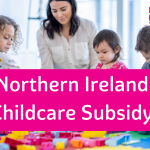Cost of living crisis hitting childcare sector and families
Employers For Childcare is warning that spiralling costs for childcare providers in Northern Ireland is leading to the closure of childcare businesses and increases in fees for parents. This could lead to parents being priced out of affording the childcare they need to work, add to the pressures on hard-pressed families and impact negatively on our local economy at a time when employers are already struggling to find and retain staff.
Employers For Childcare has been hearing from childcare providers who have already seen massive overall increases to their operating costs as inflation soars, with further rises expected. One provider highlighted that, in the last year, they have seen a 13% increase in staffing costs, a 45% increase in their electricity bill and a 20% increase in the cost of food.
While childcare providers have done all they can to keep fees down for families, these rising cost pressures, coming on the back of Covid-19, and many years of under investment, are hitting the sector hard. Many will be left with little choice but to increase fees or risk going out of business, which will put added strain on working parents, many of whom are already struggling to find and pay for the childcare they need.
Aoife Hamilton, Head of Charity Services at Employers For Childcare comments: “We have been warning about many of these issues for years, during which time the sector, and the parents and employers who rely on it, have done their best to carry on. But this is now very real and we are hearing about childcare providers being forced to close their doors in the face of rising costs. In 2021, the average cost of one full-time childcare place was already close to £10,000 per year and with childcare accounting for a greater proportion of household income for families here than elsewhere in these islands, it comes as no surprise that more parents are having to consider whether continuing to work is worth it. In the last year the percentage of women who are economically inactive due to ‘looking after family/home’ has increased. If parents are unable to participate in the workforce, then our economy as a whole is going to suffer – and that’s a problem for all of us.”
Aoife continues: “We need to see two things. Firstly urgent emergency financial support for the sector right now, to prevent more childcare providers from going out of business and protect families against further increases in costs. Secondly, we need to see continued progress on an ambitious new Childcare Strategy that properly recognises the value of childcare as key economic infrastructure and makes a real and lasting difference to this and subsequent generations. To deliver these key asks, we need an Executive in place to make decisions and deliver the investment that the sector, the parents that rely on it, and our economy and society more broadly, needs”.
She concludes: “Childcare rightly received a lot of attention in the run up to the last Assembly elections yet any progress that we are seeing on a new Childcare Strategy is being put at risk by the lack of a functioning Executive. It is simply not good enough that now we are facing into the prospect of another election, with the situation having worsened and costs continuing to increase for providers and parents. Our fear is that as we head into a political and governmental vacuum, our childcare sector cannot afford to wait any longer for the support it so critically needs. The time for manifesto pledges and empty promises is over, we must now see real delivery on policy commitments and ambitious investment to ensure we have a childcare system that is properly funded and fit for purpose”.






